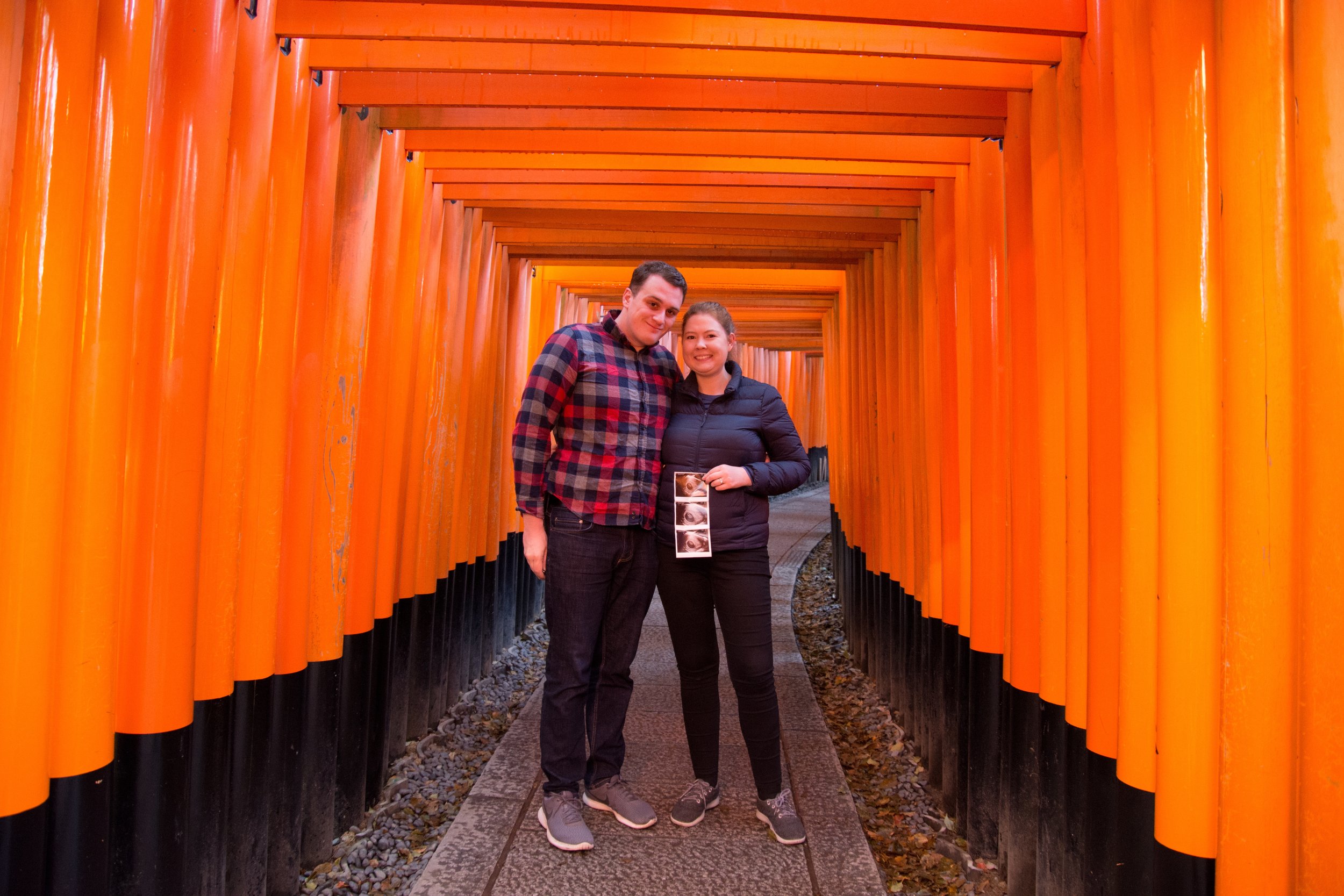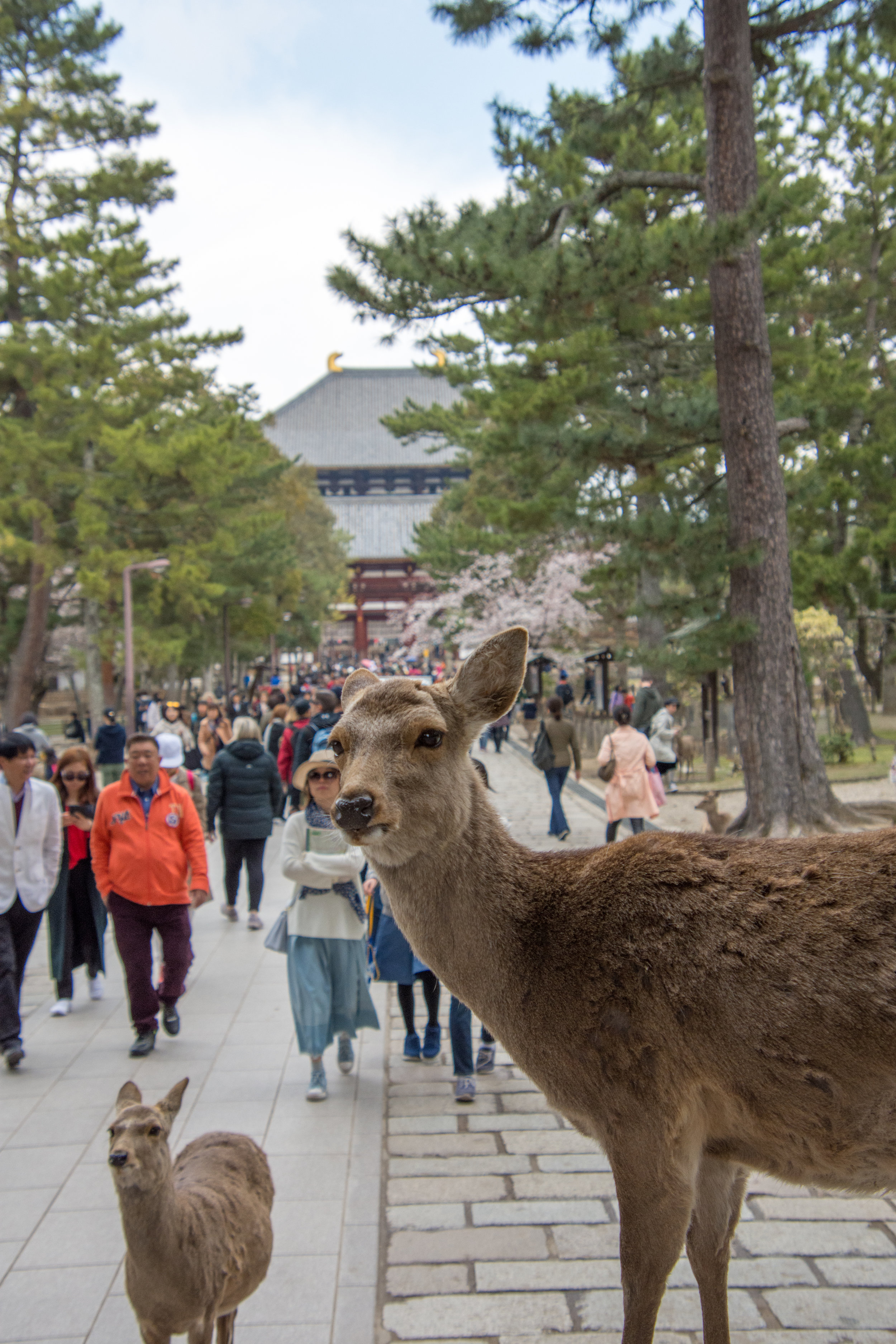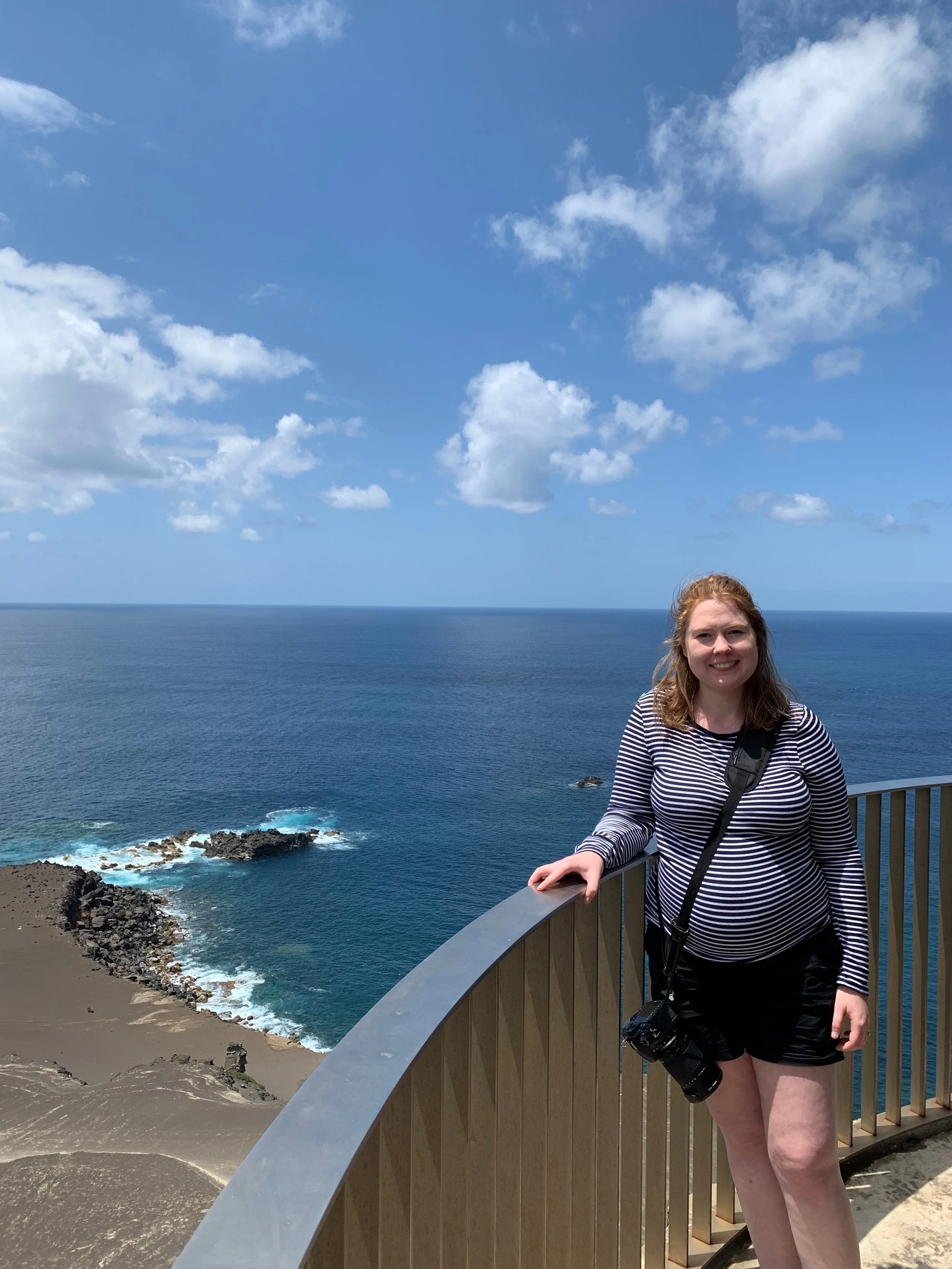Tips for Visiting Japan while Pregnant
THIS POST MAY CONTAIN AFFILIATE LINKS. WHEN YOU CLICK ON THESE LINKS WE RECEIVE COMPENSATION, AT NO EXPENSE TO YOU, THAT HELPS THIS BLOG RUN. ALL OPINIONS ARE OUR OWN.
We traveled to Japan when I was 11 weeks pregnant, in the midst of some pretty challenging morning sickness in my first trimester. We booked the trip several months ahead knowing that if things worked out, I would be pregnant on this trip. Unlike a lot of destinations, there isn’t too much you can’t do while pregnant. However, there are definitely things to be aware of before making your trip to the land of the rising sun. Japan makes a perfect babymoon for the couple who isn’t too keen on spending day after day laying on the beach. Beautiful sights, amazing culture, excellent food. It is also a destination that might be more of a hassle with a little one, making pregnancy a perfect time to knock Japan off your bucket list.
11 Weeks Pregnant at Fushimi Inari-taisha shrine in Kyoto, Japan
Plan for the Flights
Unless you are coming from somewhere else in Asia, you will likely have a pretty long flight before arriving into Japan. Long-haul flights while pregnant aren’t the most fun, but they don’t have to be daunting. Here are some basic tips to make the flight as painless as possible:
Bring your own food. With food aversions and the constant hunger, you will likely regret not having a stockpile of your favorite snacks to eat on the plane. If you are traveling on a Japanese airline, the meals they serve may not be the most appetizing or safe for you.
Fill up a reusable water bottle before boarding. To help manage your nausea and reduce swelling, drink lots of water. Ask for water anytime a flight attendant offers it to keep your water bottle full.
Get an aisle seat. With all that water you’re drinking and your growing uterus pressing on your bladder, you will likely need to make quite a few trips to the bathroom. As long as you are up walking every hour, you can help avoid swelling feet.
Take a baby aspirin. Obviously, ask your doctor first, but the blood-thinning properties of baby aspirin will help prevent clots and swelling. Make sure it is a low dose baby aspirin, as regular adult aspirin is not pregnancy-safe. Compression socks will also help prevent swelling.
Assume you won’t be able to sleep on the flight. Let’s face it, it is uncomfortable enough sleeping on a flat bed on stable land while pregnant. You may be able to get some sleep, especially if it is during your first trimester when you are extremely fatigued. However, don’t rely on it, even if you normally can sleep on flights. Bring headphones so you can spend your time watching movies. Plan a relaxed day when you arrive in Japan and an uncomplicated way to get to your hotel.
Arashiyama Bamboo Grove
Bring Snacks from Home
Traveling is often a time to be adventurous with food and sample all the local cuisine. Sometimes your pregnant stomach just won’t allow that. Food aversions are often stronger than food cravings. And if you are having a strong craving, you may not be able to find it while in Japan. Consider bringing some of your favorite snacks that you know you can tolerate and pack them with you. Note that not all food can be brought into the country. Do not bring any meat products, fruit, or vegetables. Packaged food will not give you any trouble when going through customs.
Stock up on Food from konbini
Hunger while pregnant doesn’t perfectly coincide with 3 regularly timed meals a day. Pregnant hunger is constant. While pregnant, I’ve been eating smaller meals every 2 hours. Many restaurants in Japan close mid-afternoon between lunch and dinner. This is a good 5-hour window with very limited food options. Convenience stores, or Konbinis, are not like the normal convenience stores you are used to at home. Most serve hot meals or ready to eat snacks. If you are running out of food that you brought from home or want to try some local snacks, stock up on food from one of the nearby 7-11s or Lawsons. This is a great option for when you are out exploring and don’t want to stop for a meal, for middle of the night hunger, or that dreaded 5-hour window when all other restaurants are closed.
Ask your doctor about Sushi and Onsens
Two of the most popular experiences tourists look forward to when traveling to Japan are the sushi and onsens. Both of which may not be the most pregnancy-safe. Japanese women eat sushi and bathe in hot onsens while pregnant – however, doctors from other countries might have different recommendations. Talk to your doctor prior to traveling to Japan to discuss their opinions.
I did not eat raw fish sushi or bathe in onsens, but my doctor did not absolutely restrict either. To get my sushi fix, I ate a great conveyer belt sushi restaurant with non-fish options (cucumber rolls, pickled carrot sushi, fried corn nigiri, avocado tempura). Onsens are natural hot spring baths and the major risk factor is your body temperature rising to unsafe levels for the fetus. As long as the onsen is below 100ºF (38ºC), your body temperature will not rise to an unsafe level. However, soaking in a hot bath can make you dehydrated. If you do visit an onsen, drink a lot of water to avoid a fainting spell or getting nauseous. If you feel like you are getting overheated, take a break and get out of the water. Check with the onsen prior to arriving to see the temperature of their water or if they have any restrictions for pregnant women.
Take it slow and Keep your Itinerary Flexible
Regardless of where you are in your pregnancy, you will likely be experiencing some level of fatigue and uncomfortableness. A recent research study found that pregnant women are essentially running a marathon just doing everyday tasks. Your blood volume increases, your legs have to hold up more weight, your abdominal ligaments are being stretched, your back is in pain as your center of gravity shifts, most of your body’s effort is working towards sustaining something that isn’t you, and you might even have a baby’s foot stuck in your ribs. Don’t feel bad if you have to walk slower than you normally do or if you have to take a couple of breaks walking up a set of stairs. Don’t feel bad if you have to take a taxi or the metro between sights that you would normally just walk between.
Listen to your body, if you are feeling like you want to call it quits for the day. Call it quits. It is not worth getting to the point of exhaustion. You might be spending more time in your hotel room or resting in a coffee shop than you normally do on trips, but you are still experiencing Japan. Plan out your itinerary to give yourself some free time at each city you visit in Japan. You might need to only do a half-day one day or if you are feeling great, you can fill that time with additional sights. Pregnancy lowers your immune system and traveling exposes you to a lot of illnesses, which means you might get sick on your trip. The only sickness I dealt with in Japan was morning sickness, but we traveled to Portugal a couple of months later in my pregnancy and I came down with a bad cold from the plane over there. As much as it sucks to be sick on vacation, the best thing you can do is to take a day or two off to recover. This is where flexibility or more free time in your itinerary is a lifesaver. You still have enough time to visit all your must-see spots without sacrificing the time you need to either recover from illness or general exhaustion from pregnancy.
Bring Nausea remedies
If your nausea is severe, talk to your doctor about possible prescriptions for nausea. If your nausea is only moderate, there are other non-prescription nausea remedies you may want to take with you. Even if you haven’t felt any nausea during this pregnancy, going to a new place with a lot of strong unfamiliar smells and a different cuisine may induce some nausea. Some of the easiest things to bring with you are sea-bands, ginger candies, or B6 vitamins. You may not have the best luck finding them in Japanese pharmacies or convenience stores, so bring your favorite remedy from home.
Consider spending more on ACCOMMODATIONS
When you think of Japanese accommodations, one of the first things you think of is capsule hotels. Even outside of the capsule hotels, the majority of hotel rooms in Japan are small with small beds. In order to get a larger bed (queen-sized or bigger), you will have to spend more money. A full-sized bed will get tight if you are traveling your partner and you have to accommodate them and your growing belly and extra pillows. Japan has a lot of business hotel that come at a lower cost but only offer full-sized beds. Look into western hotel chains or Airbnbs for a more comfortable sleeping arrangement. In Tokyo, consider the Hilton, Best Western, Hyatt, or Marriott.
Be aware of Japan’s Smoking laws
For all of the great things about Japan and all of their innovation, my biggest annoyance with the country is the high rates of smoking. Nearly 30% of Japanese men smoke (and 10% of Japanese women). We all know that second and third-hand smoke can be dangerous to pregnant women. We also know that it cannot be 100% avoided when out in public. Japanese laws make it even harder to avoid. Smoking is still allowed inside restaurants, bars, public areas, and some train cars. Some individual restaurants do ban smoking, but many don’t. If this is of major concern to you, look out for restaurants with a no-smoking sign on the door. More health-conscious restaurants are more likely to not allow smoking. When traveling by train, make sure you reserve a seat on a non-smoking car and one away from the inter-car smoking lounges. Some cities like Kyoto and Shibuya do have laws restricting smoking while walking on the sidewalks on most streets.
Shibuya Crossing
Row Boats at Chidorigafuchi Moat
Pack loose and comfortable clothes
It is hard to predict when exactly you’ll pop or how big you’ll get from week to week. Bring loose clothing that will be comfortable no matter if your belly seems to have doubled while you are in Japan and still looks good for the size you are now. More important than your clothes are your shoes. I switched between my comfy Allbirds and a more durable tennis shoe. If your feet get sweaty or you are traveling in the summer, I’d recommend the brand Ecco for sandals with good support.
Stay hydrated
Staying hydrated is important for your whole pregnancy, but especially when active and traveling. Carry a reusable water bottle with you at all times and fill it up the few times you come across a drinking fountain. Japan’s tap water is safe as well. If you are out and can’t find a water fountain where you are, you will definitely be able to find a water bottle at one of the ubiquitous vending machines.
Pregnant Deer in Nara, Japan
Be cautious around Wild Animals
If you are visiting Nara or Miyajima, you will definitely encounter the large free-roaming wild deer populations. For both destinations, the deer add to the charm and are a must-see experience in and of itself. These deer are, on the whole, very friendly and accustomed to humans. However, they are still wild animals that can act out when frightened. They have been known to kick or bite visitors. That might be a bit of an understatement, some months a couple hundred people are injured by the deer. While you know to not intentionally provoke the deer, you don’t know if the deer you are approaching is already agitated from a previous tourist or fellow deer encounter. This is especially true during the fall, during the deers’ mating season.
While I wouldn’t say you need to avoid these places, especially since our day in Nara was one of my favorite. However, maybe not pay for the crackers to feed to the deer. Admire the deer but from afar. To keep things honest, I did feed the deer one or two crackers, prior to knowing the serious problem Nara has been having recently with deer-related injuries. I did not have any issues. Although, I also completely avoided touching the deer to avoid any potential diseases. There are also signs around the area warning against petting the deer. Focus on yourself and only photograph the deer from afar, and you will be fine.
Look closely at your Travel Insurance Policy
Not all travel insurance policies cover pregnancy or medical complications that may arise with pregnancy. Getting travel insurance that does cover those unexpected complications is very reassuring. You don’t want to be out thousands of dollars on a trip you had to leave early right before you are about to expand your family. Our favorite travel insurance, World Nomads, does cover pregnancy but only if you travel before you’re 26 weeks and have since had a low-risk pregnancy. It also only covers pregnancy-related issues that happen during your trip and not before. So if you get put on bed rest the week before you leave, the costs associated with canceling the trip will not be covered. Many other travel insurance policies will not cover pregnancy at all unless the coverage was purchased prior to becoming pregnant. We are still on the lookout for reputable travel insurance that covers all pregnancy complications both before and during travel, even if it was purchased after becoming pregnant. However, we feel it is still worth it to get a policy that at least covers you during your trip.
















